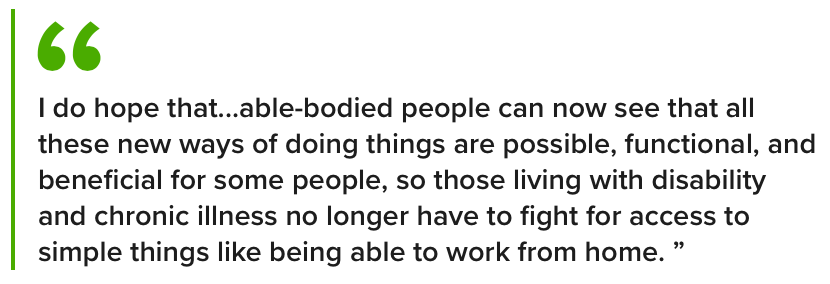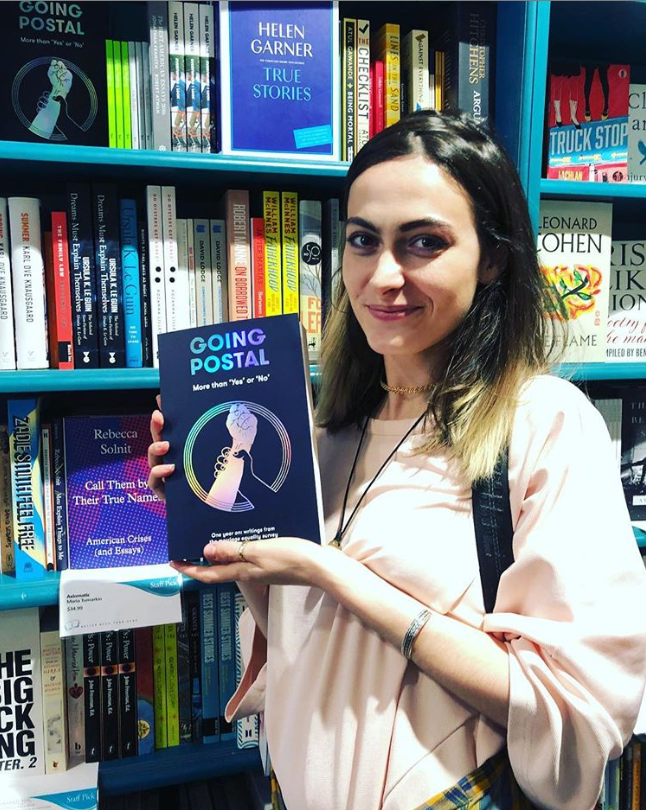Published on 18 May 2020
Chloe Sargeant is a 29-year-old writer and producer living in Sydney, Australia. Ten years ago, Chloe started developing unusual symptoms: chronic pain, fatigue, memory loss and brain fogginess. After consulting various doctors over the next eight years, she was finally diagnosed with Fibromyalgia, an incurable condition that causes her nervous system to malfunction and send incorrect signals to her brain, resulting in permanent pain.
“Chronic illness impacts my life in pretty much every way possible. I have to carefully manage my time so I don't run out of my limited energy or cause a flareup of my pain,” Chloe says. “I am on a variety of medications and supplements, and I also do...regular gentle exercise, weekly appointments with a physiotherapist and remedial masseuse and regular therapy sessions with a psychologist and pain counsellor. I also have to work pretty hard (I have a part-time day job and I also do a lot of freelance work) to manage to afford all of this – being chronically ill is not cheap.”
While the financial, physical and emotional effort of managing her illness remains difficult, Chloe says her life has actually become more social during the lockdown, and the world more accessible. The isolation that comes along with Chloe’s illness did not start when governments around the world introduced the new rules. Rationing social events with the pain and energy that goes along with them is a real part of living with a chronic illness. Chloe recently wrote about the topic, and explains “since everyone is in the same boat, the world has turned into some sort of hyper-accessible utopia to me for the first time. For example, working from home is the new normal, people are calling and contacting one another more, and everyone's totally comfortable with socialising via video chat.”
Where once venturing out with friends had to be carefully planned and was very often not an option, there are now an abundance of cultural and social activities available - and they’re ones that everyone is enjoying and joining in on. “Musicians are participating in digital festivals on social media, the zoo has set up live streams of their animals, chefs are sharing their favourite recipes and hosting live cooking shows on their Instagram accounts, and pubs and bars are hosting trivia and karaoke nights over Zoom.”

While there are many perks of working from home that able-bodied people undoubtedly appreciate, it is important to remember that expressing the frustration to disabled or chronically ill friends about not being able to venture out can be insensitive. In Chloe’s case, her social life is largely restricted to online interactions, and hearing complaints from able-bodied friends can be hurtful.
From well-meaning but unhelpful suggestions of how to feel better that range from yoga to breathing exercises, to the pervasive belief that a disability or illness must be visible to be viable, to complaining that you’re stuck indoors for months on end, there are a number of ways that the experiences of people with chronic illness and disability can unknowingly be undermined by people around them.

In 2019, working-age disbled people had just a 53.2% employment rate compared to 81.8% for non-disabled people, and when coupled with the fact that a mere 4% of businesses focus on disability inclusivity, a picture starts to be painted. The pandemic has proved to the world that the ability to work from home, be flexible with hours due to things like illness or parenting requirements, and connecting using virtual conferencing is extremely possible for companies, and that perhaps they do in fact have capacity to employ a higher percentage of people who might require different working environments or hours.
Whether these improvements to accessibility outlast the COVID-19 lockdown remains to be seen, and Chloe isn’t certain that they will. “Seeing protests in the last week about ending isolation measures is making me realise how much people despise the way they're currently having to live,” she explains. “[That’s] the way I live all the time, which feels a bit ableist and a bit of a kick to the guts – so I'm not particularly positive that all these new bright, shiny new things I've been able to access will continue after the pandemic ends.”
How it turns out will depend largely on governments and businesses, but once restrictions are lifted - and even before that - able-bodied people can all take the time to acknowledge their privilege to choose when they go out and when they stay in, amongst themselves and especially when talking to a chronically ill or disabled friend. Asked if there was one final thing she would like people to know about chronic illness during the lockdown, Chloe says her advice is “the same advice I'd give anyone, chronic illness or not: we're all just trying our best to manage and live our best lives, so be kind to each other.”

Chloe holding the anthology Going Postal which features her contributions.
To read more of Chloe’s work, visit her website.
Header image of Chloe taken by Milk & Honey Photography.